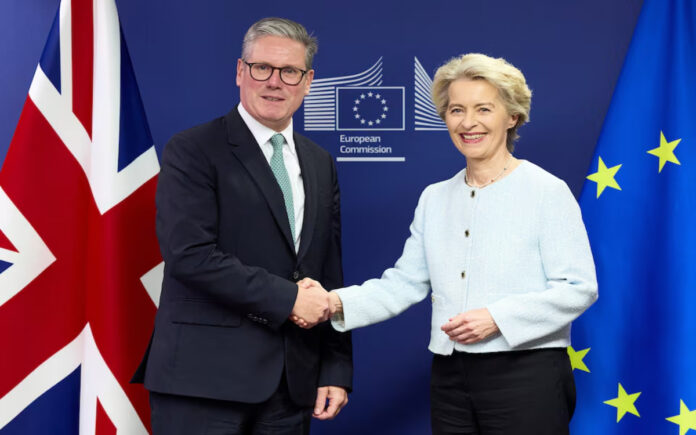Brussels: British Prime Minister Keir Starmer expressed his commitment to resetting relations with Brussels during his inaugural talks with European Commission President Ursula von der Leyen. The two leaders agreed to work swiftly to deepen cooperation between the UK and the European Union (EU).
Starmer, whose Labour Party secured victory in the July elections, has stated that his government will not pursue a complete renegotiation of the Brexit deal that resulted in the UK’s exit from the EU in 2020. Instead, he aims to make targeted adjustments to improve the relationship across various sectors. Both parties share an interest in establishing a joint security pact, although discussions regarding the movement of goods and people may prove more challenging.
Acknowledging potential difficulties, Starmer emphasized that these meetings were focused on turning a new page in UK-EU relations rather than delving into contentious issues. “There will be issues which are difficult to resolve and on areas on which we will stand firm… but we will find constructive ways to work together,” Starmer stated at a press conference.
In a joint statement, Starmer and von der Leyen agreed to hold regular EU-UK leader summits, with the first scheduled for early 2025. They also plan to meet again in the autumn prior to the summit to “take forward this agenda of strengthened cooperation at pace.”
Starmer has been proactive in seeking an EU reset, having already visited Berlin, Paris, Rome, and Dublin since his election. In addition to meeting von der Leyen, he also engaged with European Council President Charles Michel and President of the European Parliament Roberta Metsola during his first trip to Brussels as a British PM since 2019.
Starmer’s election came after a tumultuous period under Conservative governments, which saw two prime ministers resign due to their handling of Brexit. This history has made a change in tone essential. “Tone does matter. Resetting does matter, and that has been a very important part of the message,” he remarked.
Also Read | Biden Rejects Support for Israeli Strikes on Iranian Nuclear Facilities Amid Rising Tensions
A More Cooperative Approach
Von der Leyen highlighted the alignment between the UK and EU on global issues as a strong foundation for bilateral relations. She emphasized the importance of further cooperation while ensuring the full and faithful implementation of the withdrawal agreement. “We should explore the scope for more cooperation,” she stated after welcoming Starmer.
While Starmer has ruled out any return to the EU’s single market, customs union, or freedom of movement, he has committed to pursuing a new veterinary agreement to reduce border checks. Additionally, he aims for the mutual recognition of certain professional qualifications and easier access for artists touring in the EU.
Also Read | Astronomers Identify New Planet Orbiting the Closest Star to Our Solar System
Although EU leaders have welcomed Starmer’s more conciliatory approach, both sides acknowledge that substantive changes will require rigorous negotiations, even without altering the core principles of the Brexit settlement. Starmer has also dismissed plans for a youth mobility scheme, which would allow EU citizens aged 18 to 30 to live in the UK and vice versa for up to four years.
Youth mobility is a key demand from the EU, and London’s acceptance of a potential compromise may be crucial for advancing discussions on other UK interests. When asked about differences in stance on youth mobility or fishing, Starmer refrained from elaborating, noting that a more constructive approach does not eliminate the challenges ahead. “It doesn’t mean it’s going to be easy,” he concluded.



